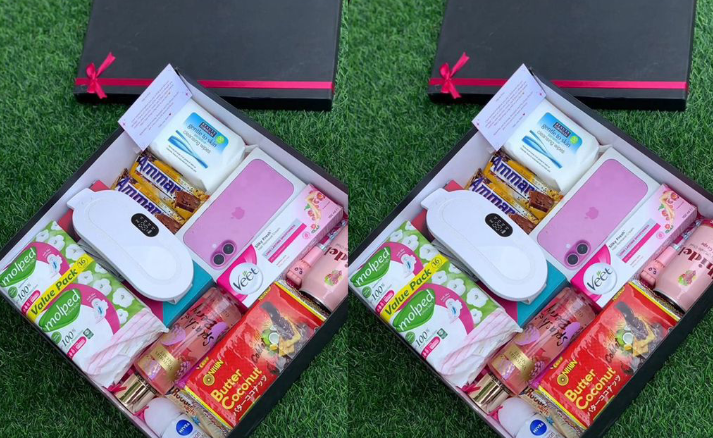
“Period Package of Loyalty?” – Social Media Erupts After Woman Claims Sending Gifts During Her Period Can Stop Cheating

The Internet erupt with another wild relationship take, and this time, it’s coming from X (formerly Twitter), where a user identified as @Amy_beke stirred massive reactions with a controversial post that has quickly become the talk of the week. The post, which reads, “Send her a period package today and she’ll never cheat on you,” has sparked endless debates about love, loyalty, and the psychology of romantic gestures in the age of social media.
In the now-viral tweet, Amy attached a photo collage showing a “period package” – a neatly arranged set of feminine products, skincare items, and self-care goodies including Veet, wipes, lotion, sanitary pads, and a few other beauty essentials. The image, which looks simple at first glance, has ignited an unexpected war of opinions as men and women across X share their thoughts on whether kindness during that time of the month truly guarantees faithfulness or if it’s just another trend feeding the growing culture of performative affection online.
The tweet’s traction was immediate. Within hours, it had thousands of likes, retweets, and comments, as users began dissecting what Amy really meant. Some saw it as a sweet reminder for men to be more emotionally supportive of their girlfriends during their menstrual cycle, a period when women often experience discomfort, hormonal imbalance, and heightened emotions. But others interpreted it as another attempt to attach material rewards to loyalty—a transactional twist that many believe is ruining modern relationships.
One user replied, “So now loyalty is for sale? Just buy a pack of pads and loyalty follows? Una don turn relationships to trade fair.” Another fired back, “It’s not about buying her love, it’s about caring. Periods are tough, and showing empathy goes a long way.” The back-and-forth continued, with both sides passionately defending their stance.
Interestingly, the comment section took an even funnier turn when a user named @queenbeth quote-tweeted Amy’s post with a photo showing an iPhone 16 sitting next to the “period package,” and wrote, “Wetin iPhone 16 dey do there?” The sarcastic remark sent everyone laughing, as it playfully mocked how gifts meant for care often escalate into expensive “add-ons” that blur the original message. Memes started flying in, with people joking that some ladies’ “period packages” now require not just snacks or comfort items but also luxury gadgets and cash envelopes.
However, beyond the jokes, the post exposed an underlying truth about how social media has reshaped expectations in relationships. The idea that gifts—whether big or small—can be a form of emotional currency is not new, but in a world where affection is often publicly displayed for validation, acts of kindness sometimes lose their sincerity. Amy’s tweet unintentionally tapped into that conversation, making many reflect on what genuine care looks like in the age of likes, retweets, and “soft life” goals.
Relationship analysts on X didn’t stay quiet either. Some self-styled love gurus weighed in, claiming that gestures like “period packages” are essential to keeping a relationship alive, especially in a generation where emotional intelligence is often lacking. They argued that little things like empathy, attention, and consistency matter far more than grand gestures. “It’s not about the Veet or the pads,” wrote one commenter, “it’s about remembering that she’s human and deserves care. When you show up for her when she’s at her lowest, she’ll remember that.”
But others countered that such ideas set unrealistic expectations for men and feed into a culture of entitlement. “If she’ll only stay loyal because of gifts, then maybe she was never loyal in the first place,” a user commented, earning thousands of likes. This perspective resonated with a large portion of men online, who argued that faithfulness should never be something to “earn” through material actions.
Still, the viral nature of the post shows how deeply people crave affection and validation. In a fast-paced digital world where love often plays out in captions and comments, the idea of a “period package” represents something more symbolic—it’s about feeling seen, appreciated, and cared for during a vulnerable time. While Amy may not have meant her tweet to spark such intense debates, it opened a window into how modern relationships balance between emotional care and material expression.
The trend even began spilling into other platforms, with TikTok users jumping on the wave, creating videos of themselves unboxing their own “period packages” or tagging their partners to drop hints. Some women showcased their boyfriends sending them snacks, hot water bottles, chocolates, and handwritten notes to help them through their menstrual cramps. For others, it became another avenue for humor—joking about “period packages” arriving late or missing entirely.
Interestingly, marketers have already caught on. A few small brands have begun promoting ready-made “period care boxes” featuring everything from herbal teas and chocolates to essential oils and self-care products, marketed as “the perfect gift to show her you care.” What started as a casual tweet is fast becoming a commercial idea, with vendors using the viral trend to push their products.
However, some psychologists warn that the deeper message shouldn’t be lost in the buzz. Emotional support, they note, goes far beyond gifts. Being present, showing understanding, and creating a safe emotional environment are what truly strengthen relationships. While gifts can enhance affection, they can’t replace empathy, communication, and trust—the true building blocks of loyalty.
As the conversation continues, one thing is clear: social media has turned even the most ordinary acts of care into viral talking points. What used to be private gestures between couples now becomes public debates about morality, loyalty, and gender expectations. Amy’s tweet might have been simple, but it triggered a complex reflection on what love means in 2025.
Should love be expressed in small thoughtful gestures like a period package? Or should loyalty be unconditional, not tied to any act or material show of affection? That’s the million-naira question left hanging in the digital air.
But one thing’s for sure—Amy’s post has cemented itself in the hall of viral relationship takes that the internet won’t forget anytime soon. Whether you see it as sweet, silly, or shallow, it has once again proven how a single tweet can spark nationwide introspection about the way we love, care, and express loyalty in this social-media-driven generation.
And as one user humorously put it under the thread, “Forget period package—just find someone who won’t cheat even if you forget her birthday.”
Yet, the tweet remains pinned on Amy’s page, still gathering reactions by the minute. For some, it’s a reminder to be kind; for others, it’s a satire of the transactional nature of modern relationships. But for everyone watching the drama unfold, one thing is certain—love, loyalty, and “period packages” have never been this entertaining.


